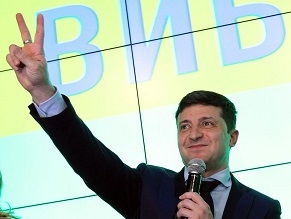|
Analytics

Volodymyr Zelensky reacts at campaign headquarters after the first round of voting in the presidential election in Kiev, Ukraine, on March 31. (Stepan Franko / EPA-EFE/REX)
|
Ukraine could elect a president with Jewish heritage
19.04.2019, Communities of Eurasia Ukrainian presidential candidates Volodymyr Zelensky and Petro Poroshenko will face off in a much-anticipated debate on Friday night.
At the same time, a block away at Kiev’s central synagogue, hundreds of the capital city’s Jews will be sitting down for a Passover Seder.
“It was suggested that I should invite Zelensky to the Seder supper,” said Ukraine’s chief rabbi, Moshe Reuven Azman. “But I don’t want to do something political. He will be at his debate. We will be here.”
Zelensky, the candidate leading in the polls, has Jewish heritage. But it rarely comes up in the public discussion of this country’s hotly contested presidential election.
Zelensky, 41, is a comedic actor who stars in a hit television comedy about a schoolteacher who is elected president after a video of him ranting about the corruption of the political elite went viral. The actor shocked the nation when he declared his intention to run in Ukraine’s real presidential election, and further when he gained the most votes in the first round.
Zelensky has rarely discussed his religious background, saying his beliefs are personal and will remain that way even if he is elected in Sunday’s polling.
In a 2016 interview with a TV talk show, well before he became a political candidate, Zelensky told a reporter: "I have Jewish blood. I am a Russian speaker, and I'm a citizen of Ukraine.”
Voters don’t seem to care either way. His anti-establishment campaign is leading in the polls by nearly 40 percentage points against President Poroshenko, 53.
Experts still say it’s a remarkable turn for Ukraine, with its centuries-long history of persecution of Jews.
In the 17th century, Cossacks massacred entire Jewish communities in Ukraine during an uprising against the Polish rulers. The Russian czars restricted Jews from certain professional and educational opportunities.
Almost 1 million Ukrainian Jews were killed from 1941 and 1944 during World War II. Over the course of two days in 1941, some 34,000 Jews were executed in a ravine just outside central Kiev known today as Babi Yar.
Anti-Semitism in the Soviet Union, an atheist state, was rampant. Soviet passports listed Jewish as a nationality.
Now, Russia, involved in separatist fighting in eastern Ukraine, is spreading false propaganda portraying the country as a fascist state where nationalists readily speak of killing Jews.
But even though anti-Semitic violence and vandalism are growing in France and other European countries, human rights monitoring groups say such attacks and crimes in Ukraine have decreased during the last decade.
In 2018, there was a drop in anti-Semitic vandalism from the previous year and an increase in the arrest and prosecution of those accused of perpetrating such crimes, according to the 2018 Report on Xenophobia in Ukraine published by the Congress of National Minorities of Ukraine.
“There have been no acts of anti-Semitic violence in Ukraine over the last two years and relatively little anti-Semitic vandalism,” wrote Halya Coynash, an analyst with the Kharkiv Human Rights Protection Group, a nongovernmental organization in Ukraine.
“Political will is important in this issue, as are statements of concern from international organizations about the level of anti-Semitism,” said Vyacheslav Likhachev, a human-rights monitor with the Congress of National Minorities of Ukraine. He said law enforcement reforms helped lead to more enforcement. “The government understood that the pressure was on and so they tried to do something about it."
Given its history, “it’s a miracle that Ukraine has the possibility to have a Jewish president,” Azman said.
Perhaps more than anything, it shows that Ukraine is a democratic, normal Western country that has distanced itself from its past Soviet traditions, Azman said.
The rabbi cautioned that there could be consequences if Zelensky does win and his presidency doesn’t meet his supporters’ expectations.
“If he does well, Ukrainians will say, ‘OK, he’s a Ukrainian,’” he said.
But if the country’s economy takes a turn for the worse or the parliament blocks the president’s initiatives, “they could blame it on him being a Jew.”
Still, Azam said, he’s optimistic about Ukraine. The country’s prime minister, Volodymyr Groysman, is Jewish, he noted. Ukrainians “finally understand that the Jewish people aren’t the problem, corruption is.”
By SABRA AYRES
The Morning Call
|
|
